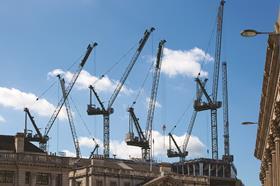CIPS survey hits new seven-year low

Brexit is being blamed for the fastest drop in construction activity in more than seven years with the commercial building market bearing the brunt of the UK’s decision to leave the EU.
The latest monthly data from the Markit/CIPS Purchasing Managers index reported a reading of 45.9 for July – the first compiled entirely after the June referendum – representing the fastest overall drop since June 2009 when the industry was engulfed by the recession.
July’s score was actually lower than the previous month’s 46.0 with any reading below 50 meaning contraction. A mark above this figure indicates growth.
Markit economist Tim Moore said: “The figures confirm a clear loss of momentum since the second quarter of 2016, led by a steep and accelerated decline in commercial building.”
He added: “UK construction firms frequently cited ongoing economic uncertainty as having a material negative impact on their order books. In particular, survey respondents noted heightened risk aversion and lower investment spending among clients, notwithstanding a greater number of speculative enquiries in anticipation of lower charges.
“Construction firms generally suggested that clients had adopted a wait-and-see approach rather than curtailed or cancelled forthcoming projects during July. While there is little to suggest an imminent turnaround in business conditions, a relief factor appears to have softened the fall in business optimism among UK construction companies.”
And the survey said insufficient new work to replace completed projects led to a decline in employment numbers for the first time since May 2013.
Commenting on the result, Will Waller, Arcadis’ market intelligence lead, said: “Despite the disappointing value, as the first PMI score fully capturing a post-referendum timeframe, for some the result will not be as bad as feared with the decline in sentiment slowing compared to last month.
“However, the drop across the sub-sectors clearly confirms that uncertainty is playing out through delayed decision making, with many procurers re-evaluating their timing and approach.
“Whilst there is little unequivocal evidence of permanent project cancellations at the moment, providing some hope, the coming months will likely indicate how long we can expect the uncertain environment to persist and therefore the longevity of the related impacts on the construction market.”



























2 Readers' comments